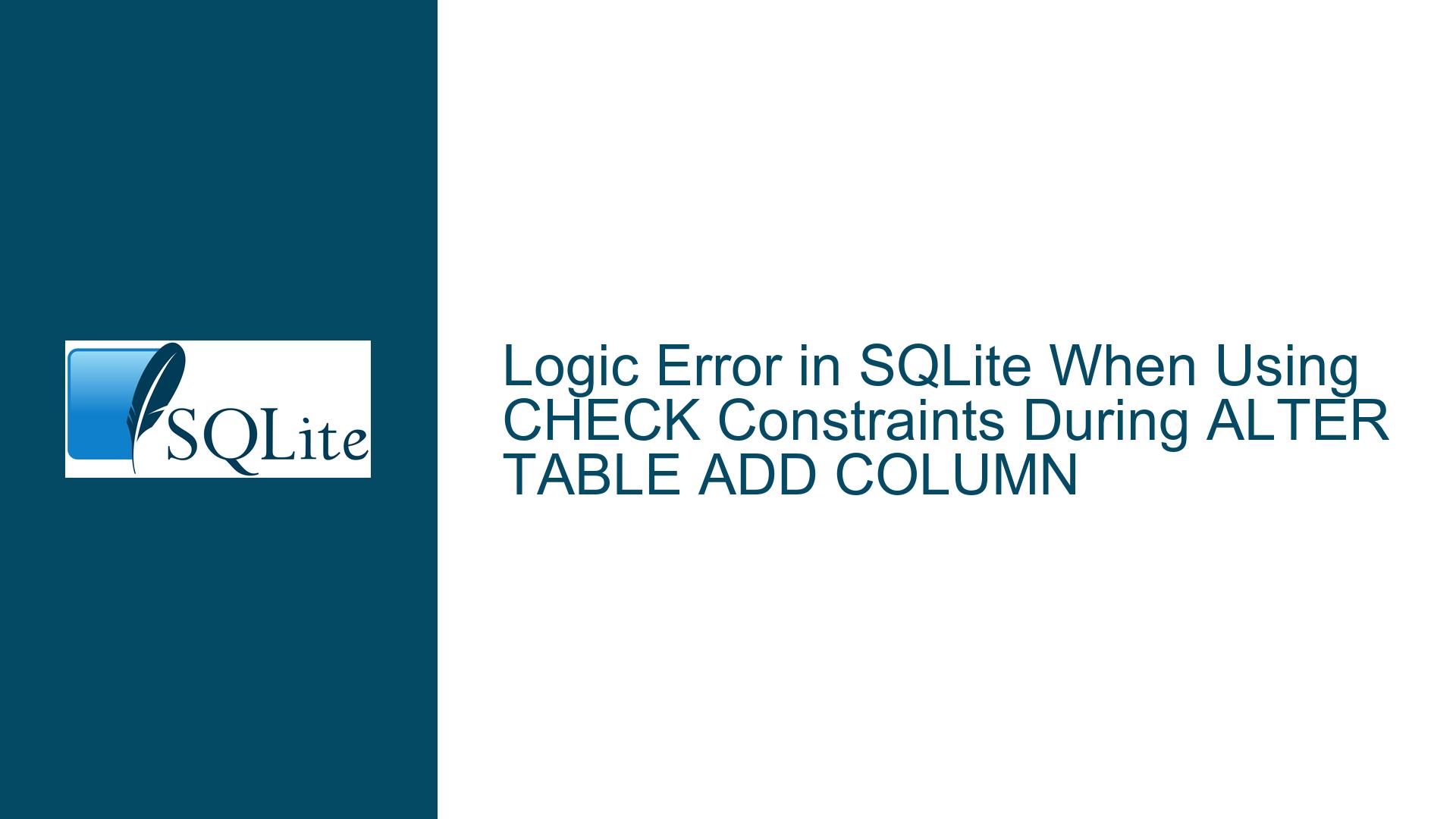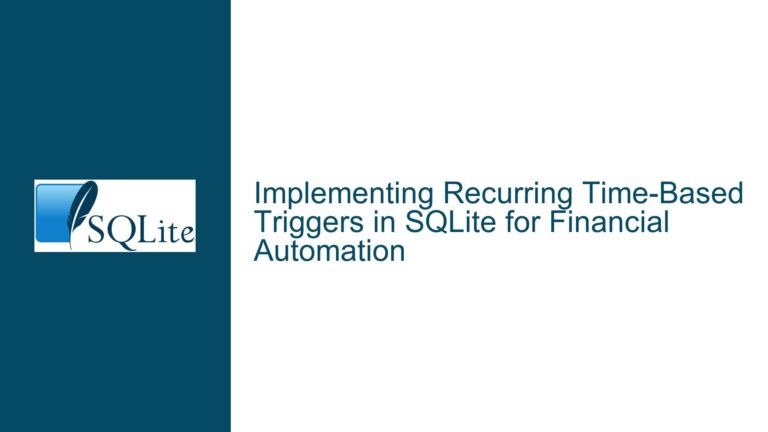Logic Error in SQLite When Using CHECK Constraints During ALTER TABLE ADD COLUMN
Issue Overview: Logic Error with CHECK Constraints in ALTER TABLE Statements
When working with SQLite, particularly in versions 3.36.0 to 3.37.2, a logic error can occur when attempting to add a column to an existing table using the ALTER TABLE ADD COLUMN statement with a CHECK constraint. This error manifests as a "SQL logic error" and is specifically tied to the compilation flag SQLITE_DQS, which controls the handling of double-quoted string literals. The error is unexpected because it does not occur when the same CHECK constraint is defined during the initial CREATE TABLE statement, regardless of the SQLITE_DQS setting.
The issue arises when SQLITE_DQS is set to 0, which disables the non-standard behavior of treating double-quoted strings as string literals. This setting is recommended by the SQLite documentation for improved SQL standards compliance. However, when SQLITE_DQS is 0, the parser and semantic analysis become stricter, leading to a logic error during the ALTER TABLE ADD COLUMN operation with a CHECK constraint. This behavior is inconsistent with the expected functionality, as the same CHECK constraint works without issue when included in the CREATE TABLE statement.
The error is particularly problematic because it affects common use cases, such as adding a column with a CHECK constraint to enforce boolean-like values (e.g., enabled INTEGER CHECK (enabled IN (0, 1))) or ensuring non-empty strings (e.g., title TEXT CHECK (LENGTH(title) > 0)). The inconsistency between CREATE TABLE and ALTER TABLE behaviors, combined with the dependency on the SQLITE_DQS setting, makes this issue both subtle and impactful for developers relying on SQLite for schema modifications.
Possible Causes: Interaction Between SQLITE_DQS, Parser Strictness, and ALTER TABLE Semantics
The root cause of this logic error lies in the interaction between the SQLITE_DQS compilation flag, the SQLite parser’s strictness, and the semantics of the ALTER TABLE ADD COLUMN operation. When SQLITE_DQS is set to 0, the SQLite parser enforces stricter compliance with SQL standards, particularly regarding the handling of string literals and constraints. This strictness inadvertently affects the semantic analysis performed during ALTER TABLE operations, leading to unexpected logic errors.
During the ALTER TABLE ADD COLUMN operation, SQLite performs additional checks to ensure the validity of the new column definition, including any CHECK constraints. When SQLITE_DQS is 0, these checks become more rigorous, and the parser may misinterpret or fail to validate certain expressions within the CHECK constraint. This misinterpretation results in a logic error, even though the same constraint would be accepted during a CREATE TABLE operation.
The issue is further compounded by the fact that the ALTER TABLE operation involves a more complex sequence of steps compared to CREATE TABLE. When adding a column with a CHECK constraint, SQLite must rewrite the table schema, validate the new constraint against existing data, and ensure that the constraint does not conflict with other table definitions. The stricter parser behavior under SQLITE_DQS=0 disrupts this process, causing the operation to fail.
Additionally, the error is specific to certain versions of SQLite (3.36.0 to 3.37.2), indicating that changes in the parser or semantic analysis logic during this period introduced the regression. The fact that the issue was later fixed in subsequent versions confirms that it was indeed a bug rather than intended behavior.
Troubleshooting Steps, Solutions & Fixes: Addressing the Logic Error in ALTER TABLE ADD COLUMN with CHECK Constraints
To resolve the logic error encountered when using CHECK constraints in ALTER TABLE ADD COLUMN statements, developers can take several approaches depending on their specific requirements and constraints. Below are detailed steps and solutions to address the issue:
1. Enable SQLITE_DQS for Compatibility
One immediate workaround is to enable the SQLITE_DQS flag during compilation. Setting SQLITE_DQS to 1 allows the parser to treat double-quoted strings as string literals, which reduces the strictness of the semantic analysis and avoids the logic error. However, this approach compromises SQL standards compliance and is not recommended for long-term use.
To enable SQLITE_DQS, modify the compilation flags as follows:
-DSQLITE_DQS=1
Recompile SQLite with this flag and retry the ALTER TABLE ADD COLUMN operation. Note that this solution is a temporary fix and should be used with caution, as it may introduce other compatibility issues.
2. Define CHECK Constraints During CREATE TABLE
If possible, define all CHECK constraints during the initial CREATE TABLE statement. This approach avoids the issue entirely, as the logic error only occurs during ALTER TABLE operations. For example:
CREATE TABLE a (
id INTEGER NOT NULL,
enabled INTEGER NOT NULL DEFAULT 0 CHECK (enabled IN (0, 1))
);
By including the CHECK constraint in the CREATE TABLE statement, you ensure that the constraint is validated without encountering the logic error. This solution is ideal for new tables or when the schema can be recreated from scratch.
3. Upgrade to a Fixed Version of SQLite
The logic error described in this issue has been identified as a bug and fixed in subsequent versions of SQLite. Upgrading to a version later than 3.37.2 will resolve the issue without requiring changes to your code or compilation flags. Check the SQLite changelog for the latest stable release and update your installation accordingly.
To upgrade SQLite, download the latest amalgamation or precompiled binary from the official website and replace your existing installation. After upgrading, verify that the ALTER TABLE ADD COLUMN operation works as expected with CHECK constraints.
4. Use Triggers as an Alternative to CHECK Constraints
If upgrading SQLite or modifying compilation flags is not feasible, consider using triggers to enforce the same constraints as CHECK. Triggers can be defined to validate data before insertion or update, providing similar functionality to CHECK constraints. For example:
CREATE TABLE a (
id INTEGER NOT NULL,
enabled INTEGER NOT NULL DEFAULT 0
);
CREATE TRIGGER validate_enabled BEFORE INSERT ON a
BEGIN
SELECT CASE
WHEN NEW.enabled NOT IN (0, 1) THEN
RAISE(ABORT, 'Invalid value for enabled')
END;
END;
CREATE TRIGGER validate_enabled_update BEFORE UPDATE ON a
BEGIN
SELECT CASE
WHEN NEW.enabled NOT IN (0, 1) THEN
RAISE(ABORT, 'Invalid value for enabled')
END;
END;
This approach ensures that the enabled column only accepts values of 0 or 1, mimicking the behavior of the original CHECK constraint. However, triggers introduce additional complexity and may impact performance, so use them judiciously.
5. Validate Data at the Application Level
As a last resort, move the validation logic to the application level. Instead of relying on SQLite’s CHECK constraints, implement data validation in your application code before inserting or updating records. This approach decouples the validation logic from the database schema, making it more portable but also less enforceable at the database level.
For example, in a Python application:
def insert_record(id, enabled):
if enabled not in (0, 1):
raise ValueError("Invalid value for enabled")
# Proceed with database insertion
While this solution avoids the logic error, it requires careful implementation to ensure data integrity across all application components.
By following these troubleshooting steps and solutions, developers can effectively address the logic error encountered when using CHECK constraints in ALTER TABLE ADD COLUMN statements. Each approach has its trade-offs, so choose the one that best aligns with your project’s requirements and constraints.






